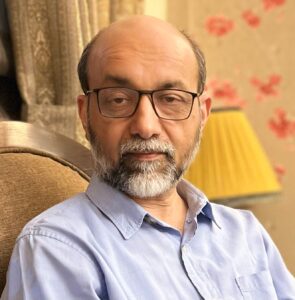 The first cHALO conference organized by the collaborative efforts of (Pakistan Society of Emergency Medicine) PSEM, (Pakistan Society of Internal Medicine ) PSIM and (King Edward Medical University) KEMU on 1st and 2nd November 2024. Emergency Physicians from Pakistan as well as from far and away came and attended this conference as speakers and as collaborators to make it a success. The main conference was preceded by 4 workshops which all were arranged in the premises of KEMU.
The first cHALO conference organized by the collaborative efforts of (Pakistan Society of Emergency Medicine) PSEM, (Pakistan Society of Internal Medicine ) PSIM and (King Edward Medical University) KEMU on 1st and 2nd November 2024. Emergency Physicians from Pakistan as well as from far and away came and attended this conference as speakers and as collaborators to make it a success. The main conference was preceded by 4 workshops which all were arranged in the premises of KEMU.
cHALO (Collaborative Hubs of Learning Organizations) is a concept created by a group of Emergency Physicians from Pakistan and UK. It was a result of a remarkable work done in 2018 in Islamabad. A group of national and International EM Physicians got together in a summit and talked about the way forward for EM in Pakistan. We chalked out various ways and initiatives that can be utilized to provide better care to patients coming to the ED all across Pakistan.
The pre-conference workshops were of the following topics: Leadership, Arrhythmias, Procedural sedation and airway management. Leadership was a new topic as there always seemed a need to equip our budding emergency physicians with skills of leadership. EM physicians work as team and should be competent to work as leaders at all levels. All these workshops attracted interest of all levels of participants including nurses and paramedical staff. The workshops were delivered par excellence and kept the interest of audience to high levels till the end.
The conference started on 1st November and it was a two day conference. Inaugural session was very well attended with more than 500 audience. President of CPSP along with Vice Chancellor of KEMU and other key stakeholders of CPSP and medical universities of Lahore were there. PSEM was represented by Dr. Khawaja Junaid Mustafa. All speakers were enthusiastic regarding the growth of EM fraternity in the last decade, and they offered all their help to develop it further. This was a great message to all attendees and well-wishers of Emergency Medicine in Pakistan and we expect to see further improvement in access to care and also the quality of Emergency Care in all the Emergency Departments across Pakistan.
The conference covered important topics for both EM and Internal Medicine interest. Renowned Professors gave important talks on various topics. Future of EM was also discussed along with the lessons learned by our International EM leaders in Various countries. Dr. John Heyworth the ex-President Royal College of Emergency Medicine shared his insight into the problems faced by the RCEM in UK and commented on progress of Emergency Medicine in Pakistan. He was happy with the progress that is made in EM in Pakistan and congratulated the team of Emergency Physicians and advised them that they are on right path. Dr. Fergal Hickey past President of Irish Association of Emergency Medicine also shared his struggle and noted similarities with Pakistan.
Another important topic was regarding trauma and its collaborative management. Trauma management is an issue in Pakistan due to the timely access to definitive care from the point of trauma. Very important points were discussed, and the most important aspect was the prevention. All participants of the discussion agreed that we need to work better on prevention of trauma, by increasing awareness of the public regarding driving competence, and also ask the government to improve the road conditions. The management of trauma patient then requires a collaborative approach with pre-hospital care and Emergency Department to the inpatient staff for the definitive care of patient and lastly the rehabilitative care to put the patient back in the system in best possible way. Everyone noticed that these limbs are developed to some extent but higher level collaboration is lacking.
Also seen was an interesting interaction of our senior clinicians regarding the definition of Emergency Doctor. Although this is already settled all across the world, and in the hearts and minds of people working in the Emergency Department across Pakistan, yet the universities and CPSP was still struggling to create their own definition. The EM leadership both Nationally and Internationally reiterated it and are hopeful that this chapter of defining the EM doctor will be closed for good.
Last session was attended by the Health Minister and he was made aware of the need faced by the EM physicians in Pakistan. He was also told regarding ways to improve the number of trained EM doctors, increasing the number of institutions for the training of EM, and improving the trauma care by helping collaborative work including the 1122 and ministry level help. Health Minister showed his great support for the cause of improving Emergency care in Punjab and also throughout Pakistan. It was also discussed in order to improve the trauma care a national level committee needed to be established to bring the people together and thus collectively improve the outcome of patients inflicted by the trauma.
We are hopeful that this conference will pave the way to create the Hubs of Learning Organizations to start the learning for the junior doctors and make them the resource for Emergency Departments. It will also pave the way for the Emergency Physicians to work as team.